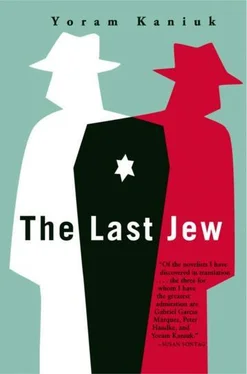Yours…
After Sam's premiere performance, there on the stage covered with thousands of pairs of shoes while a gigantic heart pounded metallically and three actors fought some war against themselves, Rachel Blau decided to reveal to her son who Sam Lipp was and who Lionel's father was. Her husband told her: Why is that so important? I'll take care of everybody and if Sam wants theater and Lionel wants to write stories, let them. Rachel didn't argue with him. She took the subway because she didn't know how to drive and didn't want to waste money on a taxi. When she came out of the station, she fainted. People who from now on would look alike to her took her to a nearby hospital. Nuns dressed in white laid her in a narrow bed, above her hung a big crucifix and below burst the melancholy cold sound of the nuns' singing. When Lionel came, she smiled at him and thought he was all the people she had seen before. She was transferred to Mount Sinai Hospital but her condition didn't improve. Lily took Lionel's hand and then touched Rachel. Rachel didn't know who they were anymore. She turned to Sam and spoke Polish. She muttered and suddenly fell silent. Her face contorted and Sam told her in Polish: Regards to Rebecca Secret Charity. Lily said: She'll recover, but everybody knew she wouldn't.
A week later, the play of the shoes closed and the reviews came in. Sam listened and was silent. Then he said: The play was no good, but I know what I want and what I want will take time, but it will be better. He came home and saw Lionel and Lily sitting with dictionaries in their hands and Lily was editing an article for Lionel for The New York Times. Sam looked at them and glanced again at a story that Lionel published in Harpers, and said: I'm a wretched creature, Lionel, a creature others die for, Ebenezer recites them, I'm not an expert in writing stories, in your articles you're wise and smart, so you succeed, but the heroes in your stories aren't wise like you, and that's not good.
The next day, Lily found a letter. Sam had sent the letter with a dog he rented in a shop of postal dogs. The dog knocked on the door and Lily opened it. There was also a bill and she paid it, patted the dog, and it wagged its tail and left. The money was in its mouth. The letter said:
Lionel, here's a list of materials to weave your poems; twenty-one thousand synagogue curtains, seventeen tons of brown and black hair, six tons of blond hair, two tons of silver and gold teeth, eight million pairs of shoes, one million six hundred thousand pairs of earrings, two million three hundred thousand silver candlesticks, two million little Havdalah towers of silver and other metals. Two tons of diamonds, thousands of kilometers of train travel, coal for the trains, track repairs, employment of train workers. Thousands of kilometers of barbed wire fence and coils, thousands of tons of gas, bullets, spades for burial, crematoria, one million five hundred thousand used beds, factories, shops, research institutes, fur hats, granite hats, felt hats, cloth hats, wool hats. Dental crowns, phosphate from bones, fat for soap, cooking ovens fit for use, cars! Silver, dollars, marks, zlotys, francs-together, more than three billion dollars, machines, presses, stockings, overcoats, carpets, works of art, luxuries, etc….
I hired the dog who brings this letter from a shop on Fourteenth Street because he looks like Ebenezer. Calculate the burials, the killings, the fear, the frozen feet, the time wasted rewriting and writing every execution, spying, axes, chamber pots. Does the energy really get lost, Lionel, if all that is later turned into a book of tears hidden by Jews in cellars?
Tape / -
The Lamentfor the Death of the Jews was written over a year. Lionel revised, corrected, rewrote, and then, when it snowed nonstop for three straight days, the first chapter of the Lament was published in The New York Times. It was based on statistics. Reactions were immediate and excited. By the time the snow melted, Lionel had been interviewed on television and had signed a contract with Harper and Row. A few days before Christmas, Sam brought home a fir tree he bought on the street. Lionel, who was concluding a phone conversation with his new agent, said: Why on earth a tree, Sam? Got to be, said Sam, I'm fed up with cemeteries. I searched for life in zoos and I studied beautiful and natural death in the Museum of Natural History, I know how living creatures turn all dread and hostility into ceremony. A Christmas tree is also a ceremony. They hate together, love together, forgive together, kill together. Lily said: A beautiful tree, Lionel, and everybody has trees.
Not me, said Lionel. Rachel is still dying in the hospital. Saul Blau would bring shirts, and in pain at his wife's condition, he started in his mind's eye to dress his hungry children in all the shirts their parents, may they rest in Paradise, didn't have. Sam already had seven hundred sixtyseven shirts and didn't wear even one of them.
In London, the section that appeared in New York was published. Criticism was excited there, too. Dead Jews are excellent material for artistic success, says Sam, the death of a Jew works today, and Lionel who had turned into a success story, written up in Time, felt crushed, borrowed from Sam, incomprehensible to himself, humiliated.
Lionel didn't think all that was happening to him, he said: Jesus was a tremendous success story and he started believing that things were again happening to Sam, and Sam-dammit-won't put up a fir tree in my room.
Sam came out of the subway station. In his hand he held the hand of a tall girl. Her name was Licinda. Once they had studied acting together. When they acted an improvised piece and he called her Melissa, he was filled with a wave of warmth he had never felt, and then he mocked her and said how tall and shrewd she was. Maybe that's love, Licinda said then and he laughed. Licinda had long hair as smooth as silk. It was light brown and looked like a cascade. A rather nervous laugh was sketched on her open face by tormented nerves. Sam and Licinda walked in the dirty melting snow and bought wine and flowers. Loaded with shopping bags, they went down the steps and entered the house. Lily said: Sam brought a girlfriend with flowers and wine. Lionel saw the shy but aggressive laugh on Licinda's face and wanted to hug her as an old acquaintance. Lily took off Licinda's wet coat and gave her some hot wine and together they stood in front of the fireplace. Big logs wisped thin smoke and spread a pleasant warmth in the room, and Sam asked Licinda to help him. Lionel sat down in the brown easy chair, put on the new eyeglasses he had started using a few months earlier and wasn't yet used to, and Lily asked, What are you doing, and Sam said: Trimming the tree for Santa, Lionel. Lionel said: That's stupid, and Lily said: Lionel, your son wants a fir tree so let there be a tree, and Lionel said: He's a grown-up now, my sons die in private hospitals in Pennsylvania and don't put up fir trees in my apartments. They didn't respond, even though they saw Lily turn pale but recover immediately and they stood the tree in a box of sand, reinforced it, Licinda took out the ornaments that Sam had bought before and the chain of small lights she had hidden in her purse. Lionel asked: What exactly is your full name? And she said, My full name, Mr. Grumpy, is Licinda Eliot Hayden. Lionel said: His grandmother is dying and he puts up a fir tree! Licinda tried to help Lily put up water and make coffee, but Lionel got up from his easy chair, took a bottle of scotch out of the chest, poured drinks, added ice, and gave one to Licinda. She understands that better than coffee, he said angrily. Sam hung the chain of lights and plugged it in. For a moment the lights shorted out. They saw themselves as demons in the light of the red stumps of wood blazing in the fireplace. Sam fixed the broken light, fixed the short, and a pleasant light spread in the room. Lily went to Sam and gave him a cup of black coffee. He stood next to the tree he was trimming, drank the coffee as Lionel, Lily, and Licinda drank scotch and turned on the radio. Christmas songs were playing on the radio. He hummed the songs to himself, and Lionel said: Lily, light Hanukkah candles. Lily said: Not me, and not you either. I'm just a wasted father, said Lionel, I didn't teach you anything. Sam laughed and said: What I've forgotten you won't have time to learn. And then he added: You're too sentimental, Lionel. You're able to yearn for things that never were. I'll tell a story: A man married off his son to a woman. He made a banquet for his friends and when they had eaten, he said to his son, Go up to the attic and bring us wine from the barrel that's kept there. The son went up to the attic, went to the barrel, was bitten by a snake, and died. The father waited and the son didn't come down. The guests ate and the father went up and saw his son thrown dead between the barrels. He waited until the guests had eaten and drunk and finished reciting the blessing, and he said to them, Gentlemen, you didn't come to recite the blessing of the bridegrooms today, but the blessing of mourners. Not to bring my son to the wedding canopy did you come, but to put him in the grave.
Читать дальше












